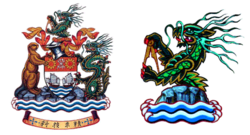The Hong Kong Institution of Engineers (HKIE, Chinese: 香港工程師學會) is a professional body of engineers in Hong Kong. It was founded in 1947 as the Engineering Society of Hong Kong and was incorporated by the Legislative Council of Hong Kong as The Hong Kong Institution of Engineers in 1975.[1] The institution aims to facilitate the exchange of knowledge and ideas, train the members in new technology and practices, and to raise the standing and visibility of engineers. It has a membership of more than 30,000 under 21 different engineering disciplines.
 | |
| Abbreviation | HKIE |
|---|---|
| Formation | 1947 (Engineering Society of Hong Kong) |
| Type | Professional body |
| Headquarters | 1 Great George Street, Hong Kong |
| Website | Official website |
Formerly called | Engineering Society of Hong Kong |
| Hong Kong Institution of Engineers | |||||||||||
|---|---|---|---|---|---|---|---|---|---|---|---|
| Traditional Chinese | 香港工程師學會 | ||||||||||
| Simplified Chinese | 香港工程师学会 | ||||||||||
| |||||||||||
History
editBefore World War II
editOn 3 June 1882, The Hong Kong Engineers' Institute was established at Hongkong Hotel, with John Inglis as the first president.[2]: 39 [3] On 8 January 1891, Institution of Engineers and Shipbuilders of Hong Kong was established at 16 Praya Central, Hong Kong, and it has replaced The Hong Kong Engineers' Institute's function.[4][5]: 44
Post-War Period
editJohn Finnie, president of Institution of Engineers and Shipbuilders of Hong Kong between 1939 and 1940 proposed to create a new engineering society focusing on training local engineers in Hong Kong. During the World War II, Finnie was imprisoned by the Japanese Army in the civilian internment camp at Stanley where he still organised talks on engineering.[2]: 81
The Engineering Society of Hong Kong was set up in 1947, following the efforts of John Finnie. The society was established in the Lee Gardens Hotel.[2]: 81 In 1972 the Society was amalgamated with the Hong Kong Joint Group of the Institutions of Civil, Mechanical and Electrical Engineers of London, and transformed into The Hong Kong Institution of Engineers with both learned society and qualifying functions three years later.
Establishment of The Hong Kong Institution of Engineers
editIn 1975, the Legislative Council of Hong Kong passed The Hong Kong Institution of Engineers Ordinance which granted the institution statutory status.[6]
Milestones
edit1947 - Founding of Engineering Society of Hong Kong
1972 - Amalgamated with the independent Hong Kong Joint Group of the Institutions of Civil, Mechanical and Electrical Engineers of London
1975 - Incorporated by Law as The Hong Kong Institution of Engineers
1982 - Recognition of the HKIE Corporate Members by the Government for Civil Service Appointments
1995 - Admitted to the Washington Accord
1997 - 50th Anniversary of the Founding of Engineering Society of Hong Kong
2001 - Admitted to the Sydney Accord and the Engineers Mobility Forum (EMF)
2003 - Admitted to the Engineering Technologists Mobility Forum (ETMF)
2005 - 30th Anniversary of the HKIE Incorporation
2007 - 60th Anniversary of the Founding of Engineering Society of Hong Kong
2009 - Admitted to the Seoul Accord
Education and Training
editThe Hong Kong Institution of Engineers has a system to assess the standards of engineering programme in various tertiary institutions in Hong Kong to determine whether to recognise the qualifications of the programme for graduates to join the Institution.[7] The Institution's accreditation board conducts professional assessments of Bachelor's, Associate's and Higher Diploma programmes in Engineering and Computer Science in Hong Kong and overseas universities. The Bachelor of Engineering program that meets the standards can be accredited under the "Washington Accord", and the Bachelor of Computer Science program can be accredited under the "Seoul Accord"; as for each sub-degree program that meets the academic requirements of the Institution, it can be accredited under the "Sydney Accord".[8]
The Institution also provides Continuing Professional Development activities to engineers to increase their quality.[9]
Publication
editThe Hong Kong Institution of Engineers, as an academic body in the engineering field in Hong Kong, has a publication HKIE Transactions. Published quarterly since 1994, the HKIE Transactions provides a platform for engineers to discuss various aspects of engineering from both theoretical and practical perspectives. The journal welcomes submissions of research papers, literature reviews, engineering case studies, technical notes or articles and written discussions involving advanced technology[10]。
The HKIE also publishes the monthly magazine "Hong Kong Engineer", the Institution Yearbook and the Annual Report[11]。
See also
editReferences
edit- ^ "History & Heritage". The Hong Kong Institution of Engineers. Retrieved 17 January 2022.
- ^ a b c Fung, KW; Lau, YW; Chan, CM (2015). The Hong Kong Institution of Engineers (ed.). Upon the Plinth of a Barren Rock: 130 Years of Engineering Development in Hong Kong. Hong Kong: Chung Hwa Book. ISBN 978-988-8310-19-7.
- ^ "The Hongkong Engineers' Institute". The Hongkong Daily Press. Hong Kong. 5 June 1882. p. 2.
- ^ The Chronicle & Directory for China, Japan & the Philippines for the Year 1898. Hong Kong: Hongkong Daily Press. 1897. p. 268.
- ^ "The Institution of Engineers and Shipbuilders of Hong Kong Incorporated 1980 Notice". The China Mail. Hong Kong. 5 January 1891. p. 1.
- ^ "Cap. 1105 The Hong Kong Institution of Engineers Ordinance". Legislative Council of Hong Kong. 5 December 1975. Archived from the original on 8 June 2020. Retrieved 20 January 2022.
- ^ "Accreditation Criteria". The Hong Kong Institution of Engineers. Archived from the original on 25 June 2018. Retrieved 31 January 2019.
- ^ "Lists of Accredited / Recognised Programmes". The Hong Kong Institution of Engineers. Archived from the original on 29 June 2018. Retrieved 31 January 2019.
- ^ "Continuing Professional Development". The Hong Kong Institution of Engineers. Archived from the original on 27 June 2018. Retrieved 2 February 2019.
- ^ "HKIE Transactions". The Hong Kong Institution of Engineers. Archived from the original on 4 February 2021. Retrieved 2 February 2019.
- ^ "Publication". The Hong Kong Institution of Engineers. Retrieved 2 February 2019.